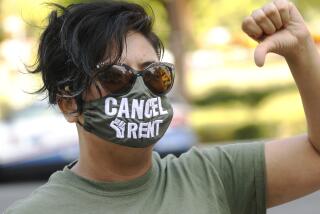Protecting the Public Means Also Protecting the Accused
- Share via
No one wants drug dealers or prostitutes on their street corners. As their presence increases in neighborhoods across Southern California, so do the frustrations of police and residents who feel overwhelmed and under siege. Last year, a state law intended to help the situation made it a crime for people to loiter with the intent to sell drugs or to sell themselves. That way, the law’s sponsors argued, police could nab suspected hookers and dealers before, rather than after, a crime had occurred. But seven months after the law took effect, some local police complain that it is harder than ever to make a bust.
In Los Angeles, some officers and residents claim that a series of guidelines drawn up by the city attorney’s office makes enforcement of the law too cumbersome to be practical. To make a prostitution-related case under the law, for example, officers must first meet a series of requirements--including taking a full-length photo of those they arrest and documenting that the person has a history of prostitution. Many cops on the street lack the time and resources necessary to complete all the requirements.
Some police divisions--such as Hollywood and Rampart--are able to take full advantage of the law because they have special units and extra officers devoted to cracking down on prostitution and drug dealing. Other divisions, meanwhile, have seen their vice units dwindle as officers are put instead on regular patrol assignments. Some point to looser guidelines in Long Beach, which requires only that officers see a suspected prostitute loitering and engaging in activity consistent with soliciting, such as repeatedly beckoning and stopping passersby.
Easing the restrictions is not the answer. From its inception, the law by Assemblyman Richard Katz (D-Sylmar) has been problematic because it essentially criminalizes an otherwise legal activity: loitering. The U.S. Supreme Court has ruled that loitering can only be considered an illegal activity if it has a sinister purpose, such as waiting for the opportunity to commit a crime. Proving that someone committed a crime is tough enough. Proving that someone was about to commit a crime is even tougher.
The American Civil Liberties Union and others predicted the law could have dangerous effects. People could be singled out because of their clothes. Or their friends. Or their ethnicity. One assemblywoman who argued against the bill said she was stopped by police in an airport parking lot and accused of prostitution late one night because she is black. To its credit, the law outlines the specific conditions under which arrests can be made. For instance, loitering must be accompanied by other activities that are generally associated with drug dealing or prostitution, such as repeatedly waving down cars or passersby. Even so, some cities remain nervous that the law would not stand up if challenged in court. San Francisco uses the law only in conjunction with its long-standing--and constitutionally secure--public nuisance ordinance.
But as one of the primary authors of the bill, the city attorney’s office has a stake in making sure the law succeeds. The guidelines it established are designed to prevent the kind of abuses feared by the ACLU and others and to keep the law’s application focused enough to stave off a legal challenge. On a practical level, the guidelines ensure that cases are solid and based on more than just the gut feelings of police. Perhaps some of the disappointment in the law stems from overblown expectations. Many officers and residents were sold on the law as a magic bullet to clean up the streets. But it remains just one of many tools at the disposal of officers. Although designed to protect the public, those tools must also protect the rights of the accused. However cumbersome, the guidelines should remain intact. Cutting constitutional corners is no way to keep our street corners safe.
More to Read
Sign up for Essential California
The most important California stories and recommendations in your inbox every morning.
You may occasionally receive promotional content from the Los Angeles Times.










